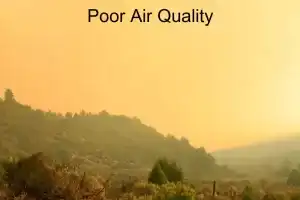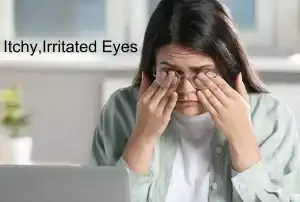By Qineng Tan, L.Ac. Ph.D. and Xiaomei Cai, L.Ac., Ph.D.

During difficult times—natural disasters and fires, in particular—it is more important than ever to protect and optimize your physical, mental, and emotional health.
When air quality in your area is poor, it is necessary to take measures to protect your health and that of your family. Breathing in smoke, even for a short period of time, can have an immediate, negative impact on your health.
Even if you can’t smell it, smoke and other air pollution can irritate your nose, eyes, and throat, and even make you feel nauseated.
Smoke inhalation affects your respiratory air passages and lungs, causing swelling that leads to wheezing and other problems with breathing.
You may not feel anything right away, but the damage is happening, as your body is not getting the oxygen it needs, and you may begin to notice it after a few hours.
Other effects of inhaling smoke and chemicals in the air include:
- Coughing, phlegm
- Wheezing, asthma attack
- Scratchy throat
- Irritated sinuses, sinus pain
- Headache
- Nausea
- Burning, stinging eyes, watery eyes, or dry eyes
- Runny nose, sinus drainage
Top 5 Tips for Preventing Smoke Pollution Effects

Here are some tips to help you best deal with the effects of smoke air pollution:
- Stay inside as much as possible. When going out, wear a good quality mask, ideally an N95 mask. If you don’t have an N95 mask, a surgical mask, cloth mask, or scarf is better than nothing, to help keep smoke from getting into your throat, nose, and lungs.
- When in your car, use the setting that recirculates the air, which prevents outside air from entering the cabin of your car.
- Stay hydrated. Drink plenty of water and warm liquids: herbal tea, body temperature lemon water, and broths. Chrysanthemum tea is an especially good choice, as it is calming, and good for soothing eye irritation.
- Irrigate your nasal passages with saline solution, which can help relieve allergic rhinitis.
- Use an air purifier with a HEPA filter in your home to filter particulate matter out of the air. Keeping house plants also helps keep the air in your home clean.
It is natural to feel anxiety and emotional stress when bad things are happening all around you. It is essential that you take time to calm and center yourself, so that you can make good decisions and be there for your loved ones and neighbors.
Take time to meditate and care for yourself. Show your love and concern for those around you, and don’t hesitate to reach out and ask for help.
Avoid reliance on caffeine, alcohol, and sugar. These things can cause dehydration, inflammation, and overstimulation. Be sure you and family are drinking plenty of water and eating nourishing foods.
One of our favorite recipes that helps to clear mucus from the lungs is to puree steamed asian pears, mash, and eat as you would applesauce. This traditional home remedy for lung congestion is also helpful when someone has bronchitis or a stubborn chest cold.
Listen to soothing music. Don’t keep the news programs on all the time. Do what you need to do to have your essentials packed and ready, without overreacting.
Do your best to keep a positive mindset. Trust yourself to know what is best for you and your family. You have come through difficulties before, and you will do it again.
From all of us at Art of Wellness, we encourage you to stay strong and healthy through this crisis. We will be here to help you in every way we can.
*This article is for education from the perspective of Traditional Chinese Medicine only. The education provided by this article is not approved by FDA to diagnose, prevent, treat and cure human diseases. It should not stop you from consulting with your physician for your medical conditions. Traditional Chinese Medicine is based on Qi, which is an invisible force that usually cannot be observed by modern science. Because science focuses on testing ideas about the natural world with evidence obtained through observation, these aspects of acupuncture can’t be studied by science. Therefore acupuncture and Chinese herbs are often not supported by double-blind, randomized trials, and they are considered alternative medicine therapies in the United States.
